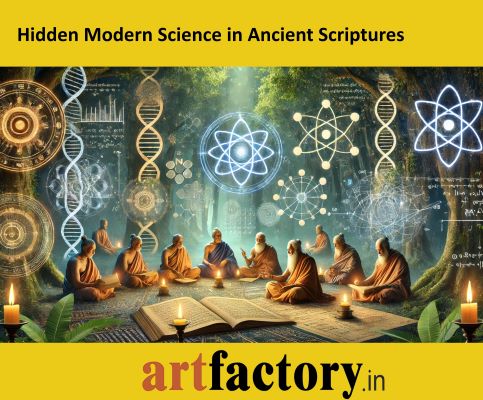
Hidden Modern Science in Ancient Scriptures
Introduction
For centuries, ancient scriptures have been revered for their spiritual and philosophical wisdom. However, modern science is increasingly discovering that these age-old texts contain profound scientific insights that were far ahead of their time. From quantum physics to medicine, astronomy to psychology, ancient scriptures hold a treasure trove of knowledge that aligns with contemporary scientific principles.
Scientific Concepts in Ancient Scriptures
1. Atomic Theory and Quantum Physics
The Vedas and Upanishads, sacred texts of Hinduism, describe the concept of "Anu" (atom) and "Parmanu" (subatomic particles). Acharya Kanad, an ancient Indian sage, formulated atomic theory around 600 BCE, long before Dalton’s atomic theory in the 19th century.
Similarly, the Bhagavad Gita mentions the concept of the universe being created from imperishable particles, which resonates with modern quantum mechanics and the idea of wave-particle duality.
2. Astronomy and Cosmology
The Rig Veda speaks of multiple universes (Brahmanda), a concept akin to the modern multiverse theory. Ancient Indian astronomers like Aryabhata and Varahamihira calculated the Earth's circumference, planetary motions, and solar system mechanics with remarkable accuracy—knowledge that aligns with present-day astrophysics.
Ancient Egyptian texts also describe cosmic cycles and celestial movements that parallel modern astronomical observations.
3. Medicine and Ayurveda
The Ayurvedic texts, including the Charaka Samhita and Sushruta Samhita, document advanced medical knowledge. Sushruta, the "Father of Surgery," detailed over 300 surgical procedures, including plastic surgery, long before Western medicine caught up.
Modern science now validates many Ayurvedic principles, such as the gut-brain connection, detoxification techniques, and herbal medicines that are increasingly incorporated into integrative medicine.
4. Psychology and Neuroscience
The Yoga Sutras of Patanjali and Buddhist scriptures elaborate on consciousness, meditation, and the functioning of the mind. Recent neuroscientific research confirms that meditation alters brain structures, enhances cognitive function, and reduces stress, proving that ancient meditation techniques have a strong scientific basis.
5. Sound and Vibrations
The concept of sound vibrations affecting matter and consciousness is deeply rooted in ancient scriptures. The Sanskrit term "Nada Brahma" (the universe is sound) corresponds with modern studies on vibrational frequency and cymatics, which demonstrate how sound frequencies can shape physical matter and influence mental states.
6. Environmental Science and Sustainable Living
Ancient texts emphasize sustainable practices, from water conservation techniques mentioned in Vedic scriptures to sacred groves that protected biodiversity. Modern ecological studies now recognize the importance of these principles in combating climate change and preserving ecosystems.
Why Modern Science Aligns with Ancient Scriptures
Advanced Mathematical Calculations: Many ancient civilizations used sophisticated mathematics, including Pi and the Fibonacci sequence, centuries before they were formally recognized in the West.
Predictive Knowledge: Ancient sages spoke about concepts such as the interconnectedness of all beings, a notion now supported by systems biology and quantum entanglement.
Holistic Healing: Ayurveda and Traditional Chinese Medicine emphasize balance in bodily functions, an approach now endorsed by functional medicine practitioners.
Psychophysical Effects of Rituals: Modern research confirms that chanting, prayer, and rituals impact brainwaves and emotional well-being, aligning with findings in psychoneuroimmunology.
Conclusion
The intersection of ancient scriptures and modern science is a fascinating domain where age-old wisdom meets empirical validation. While skeptics may view ancient texts as mythological, science continues to uncover the hidden truths embedded within them. By bridging the gap between ancient scriptures and scientific research, we can unlock timeless wisdom to benefit humanity in the modern era.
FAQs
Q1: How do ancient scriptures contain scientific knowledge?
A1: Ancient scriptures, such as the Vedas and Upanishads, contain references to atomic theory, cosmology, medicine, and psychology, many of which align with modern scientific discoveries.
Q2: What scientific concepts are found in ancient texts?
A2: Ancient texts discuss atomic structure, multiverse theory, planetary motion, Ayurveda, meditation, and vibrational energy, which modern science has now validated.
Q3: Are there references to quantum physics in ancient scriptures?
A3: Yes, texts like the Bhagavad Gita and Upanishads mention concepts similar to quantum mechanics, such as wave-particle duality and the imperishable nature of matter.
Q4: How does Ayurveda relate to modern medicine?
A4: Ayurveda's principles of holistic healing, herbal medicine, and gut-brain connection are now widely accepted in integrative and functional medicine.
Q5: Did ancient scriptures predict modern scientific discoveries?
A5: Many concepts found in ancient texts, such as sound vibrations influencing matter and cosmic cycles, closely align with contemporary scientific findings.
Q6: What role does astronomy play in ancient scriptures?
A6: Ancient texts describe planetary orbits, cosmic cycles, and the concept of multiple universes, paralleling modern astrophysical theories.
Q7: How is meditation in ancient scriptures connected to neuroscience?
A7: Scientific research confirms that meditation, as prescribed in ancient scriptures, enhances brain function, reduces stress, and alters neural pathways for better cognitive health.
To read more,click on:https://www.artfactory.in/blog/ramayan-mahabharat-se-jeevan-prabandhan-ke-siddhant
For more details,visit:https://www.artfactory.in/

Comments : (0)